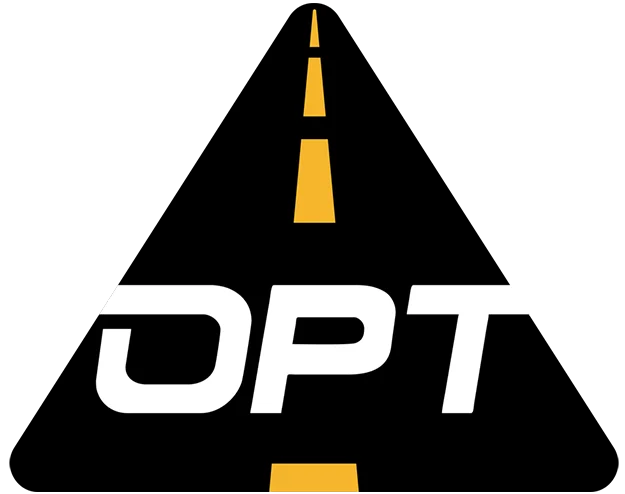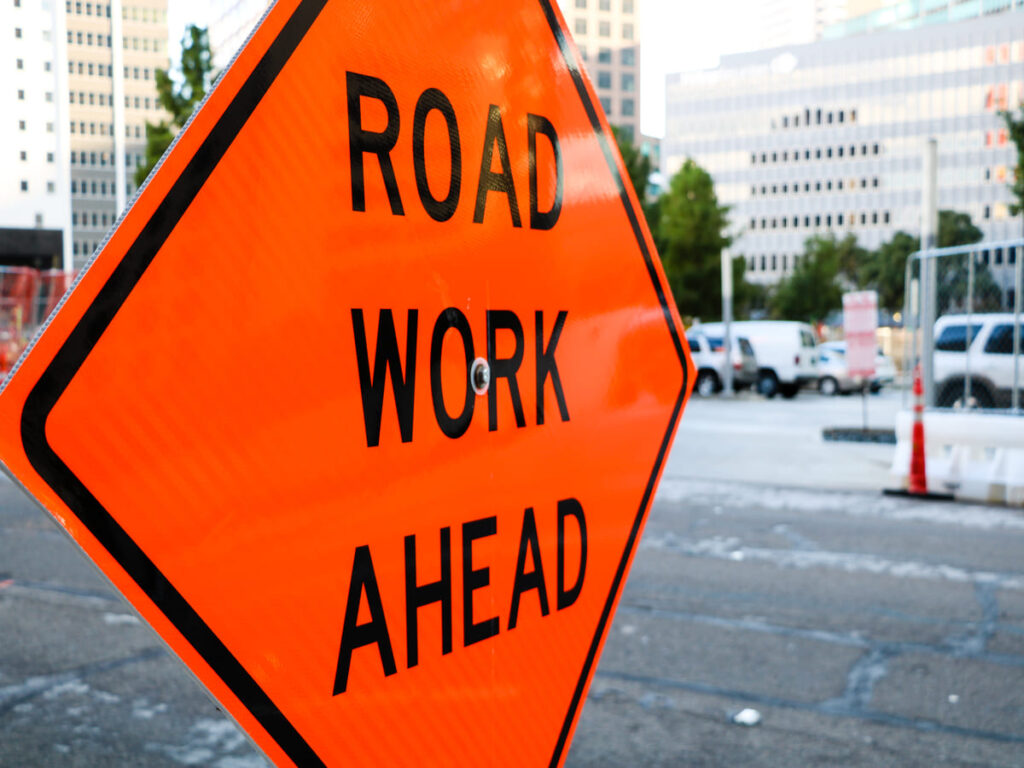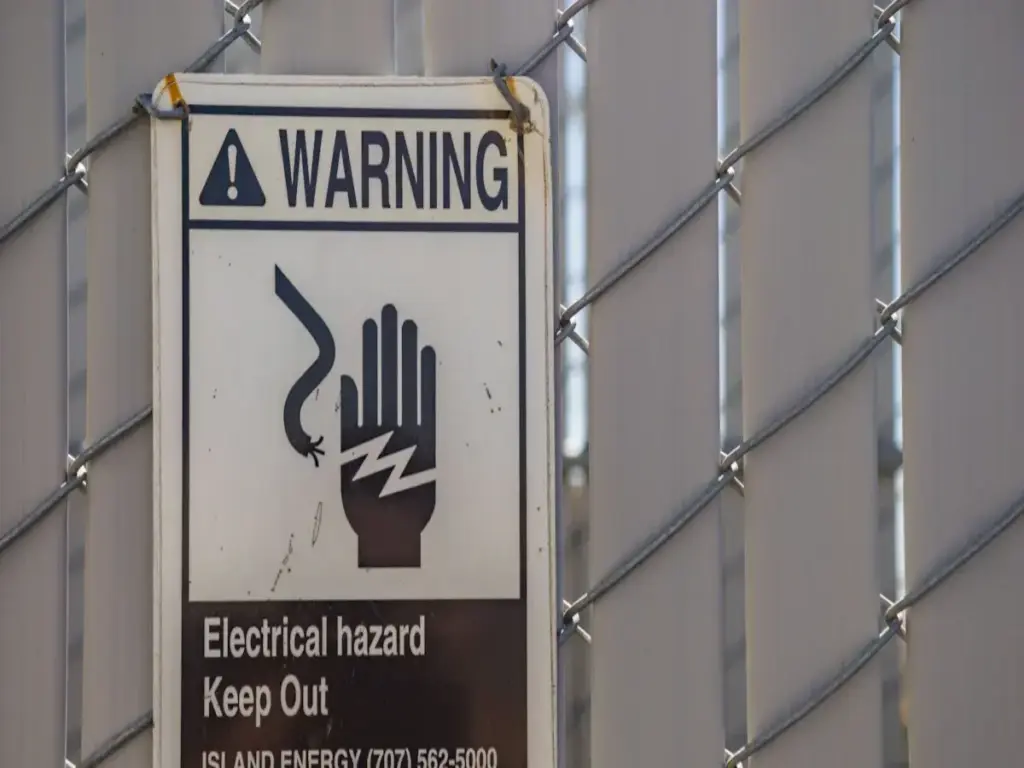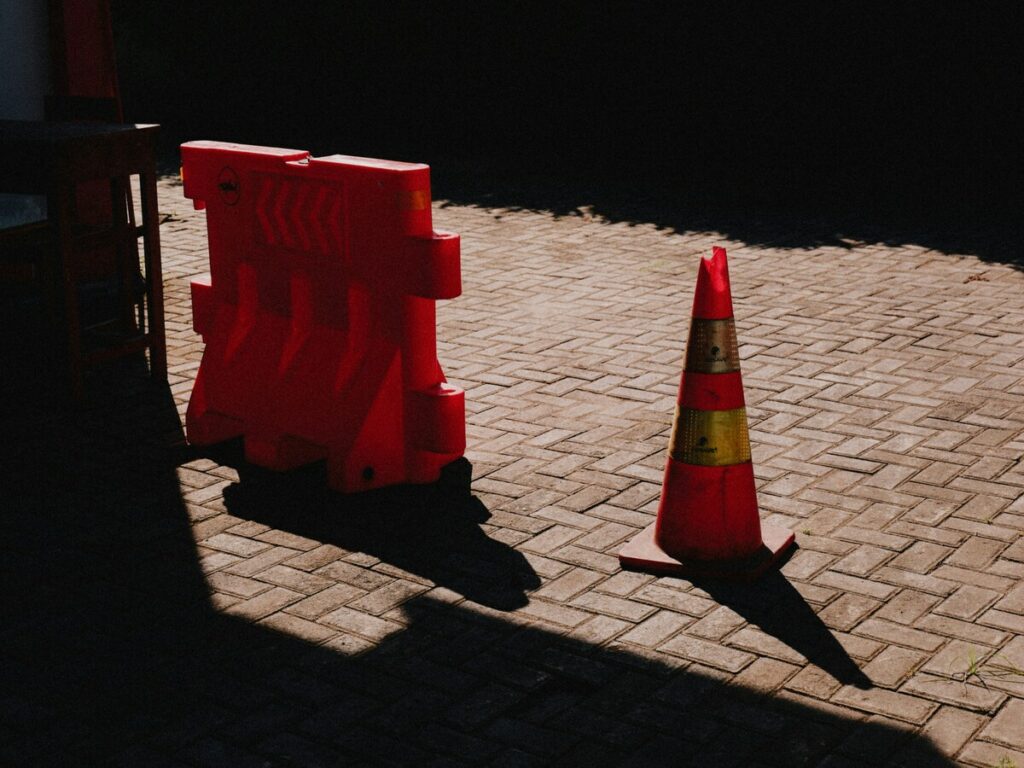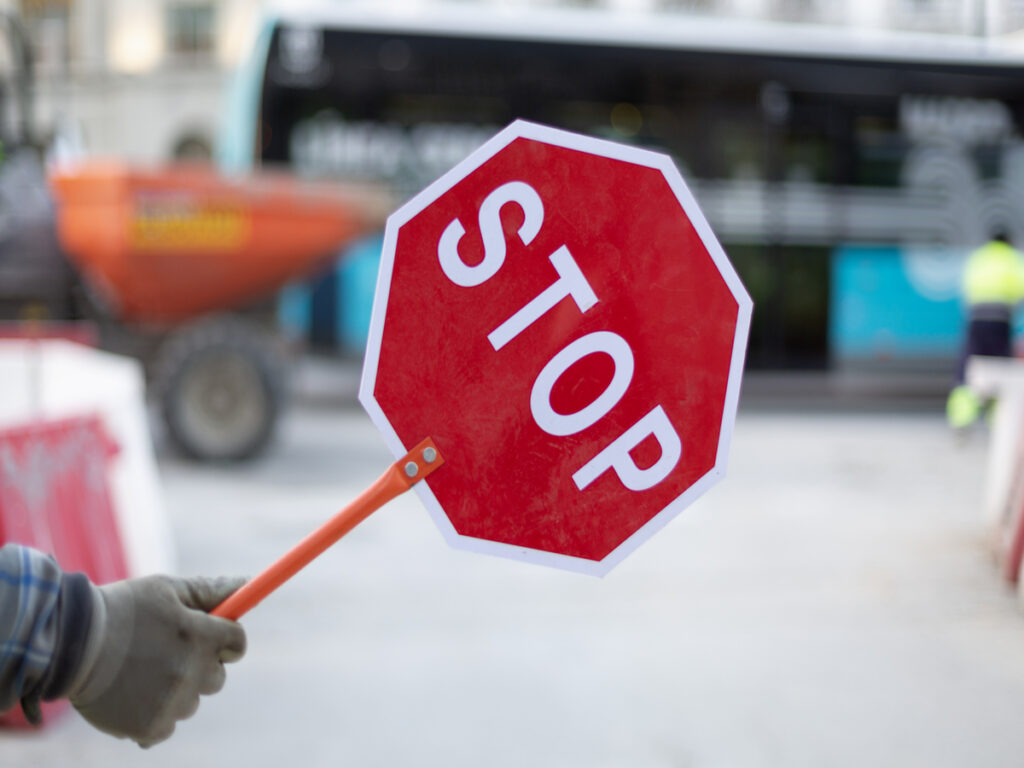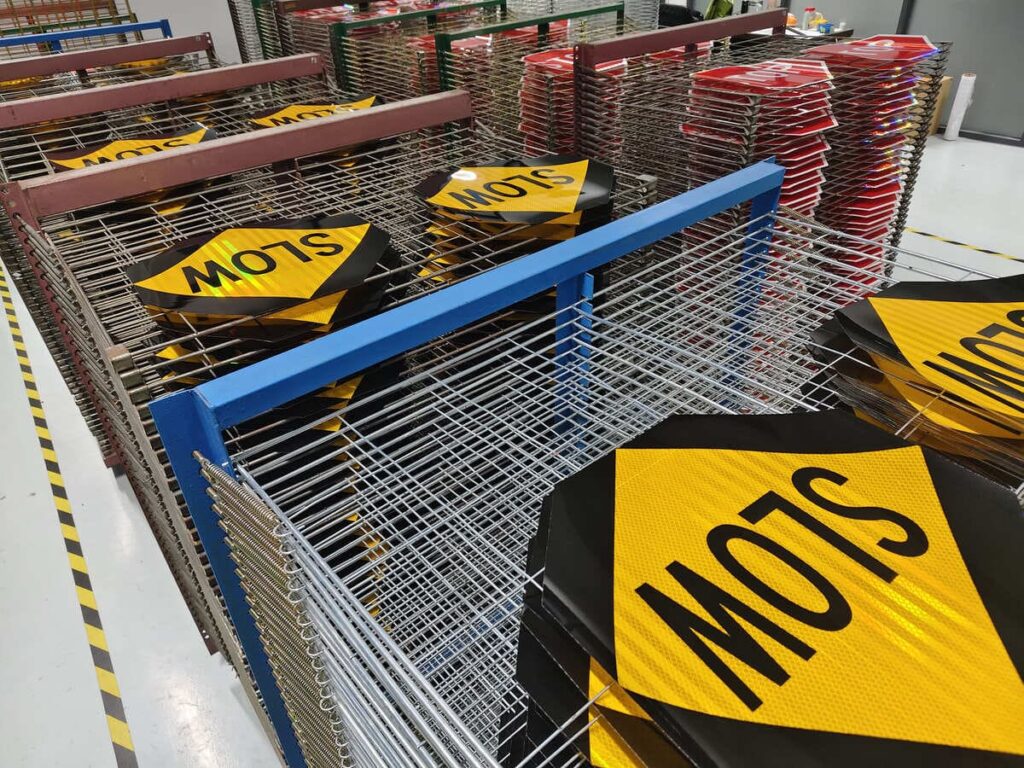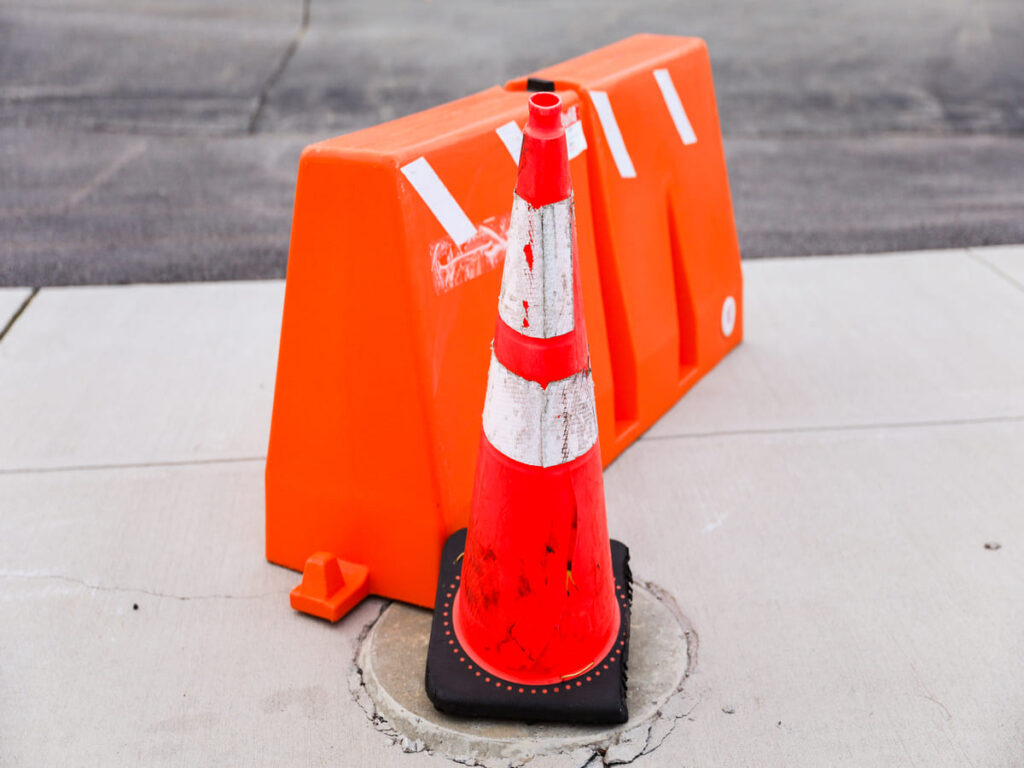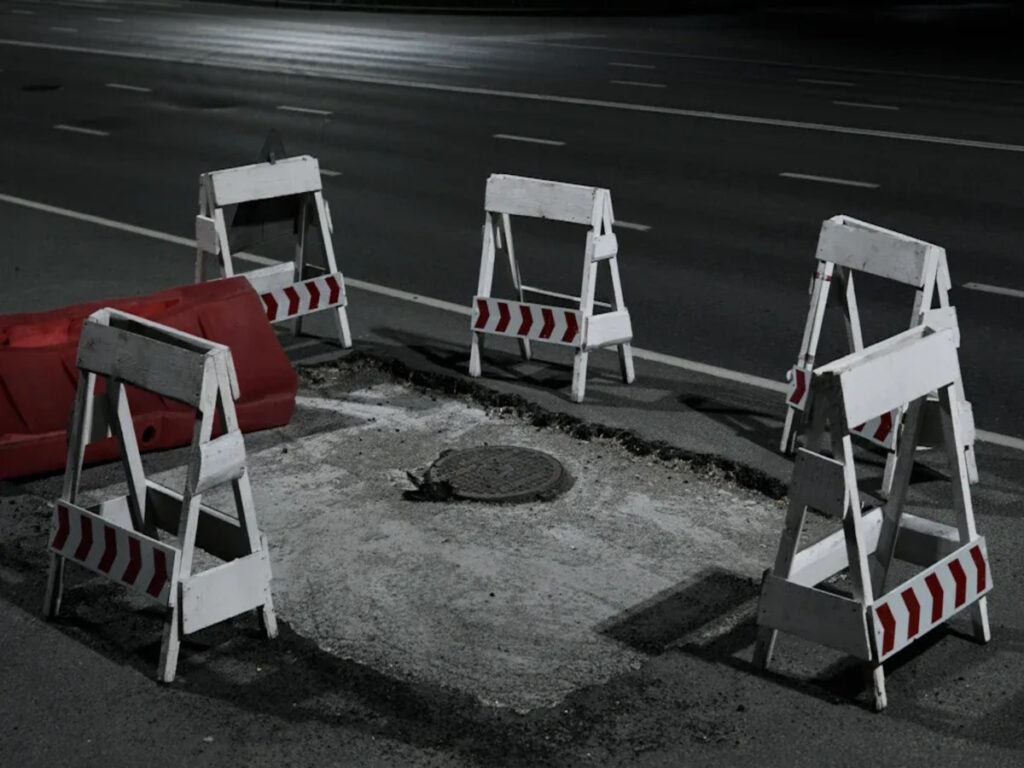
交通安全に関しては, 適切な安全バリケードを選択することは、作業者とドライバーの両方を保護するために不可欠です. タイプ 1 タイプ 2 安全バリケードはさまざまな目的に使用され、さまざまなレベルの視認性と耐久性を提供します。. 入力しながら 1 バリケードは通常、交通量が少なく、危険度が低いエリアに使用されます。, タイプ 2 バリケードはより目立つように設計されています, 強化された保護が必要な交通量の多いゾーン. これら 2 種類の安全バリケードの違いを理解すると、特定の交通安全ニーズに最も適切なオプションを確実に選択できるようになります。.
Optrafficは、さまざまな高品質を提供しています 安全バリケード, タイプを含む 1 タイプ 2, 最高の視認性基準を満たすように設計されています, 耐久性, とパフォーマンス. 今すぐ当社のセレクションをご覧になり、交通安全要件に適したバリケードをお選びください.
安全バリケードの概要
安全バリケードは交通安全にとって非常に重要です. 車が正しい方向に進むのに役立ちます. 労働者の安全を守り、人々が危険な場所に立ち入るのを阻止します。. 研究によると、ガードレールや高くなった中央分離帯などの障壁が車の道路逸脱を阻止している. これらのバリアは、歩いたり自転車に乗ったりする人も守ります。. 車の速度を落とし、衝突のリスクを下げるのに役立ちます. セーフ システム アプローチでは、障壁を使用して怪我や死亡を防ぎます。. ドライバーが間違いを犯さないようにサポートするものがあれば、道路はより安全になります.
適切な安全バリケードの選択に関する詳細はこちら, ブログをご覧ください, 販売のための交通バリケードについて知っておくべきことすべて.
安全柵の種類
英国には安全柵がたくさんある. Each one has a special job. 人が落ちるのを止める人もいる. 他の人は車が行くべきではない場所に行くのを止めます. 以下の表は、最も一般的なタイプとその機能を示しています。:
| 英国で一般的なタイプの安全柵 | 説明 |
|---|---|
| ガードレール | 転落を防ぐために歩道や高い場所に設置してください. 適切な高さにバリアを作る. |
| ラッキングプロテクター | 保管ラックをフォークリフトや他の機械から安全に保ちます. ラックの強度と安全性を維持するのに役立ちます. |
| 安全柵 | 危険な機械や場所の周囲に安全なエリアを作ります. 人々が行ってはいけない場所に行くのを阻止します. |
| 安全ボラード | 短い, 車が人や機械の通行する場所に進入するのを阻止する強力な支柱. |
| ドア用安全柵 | 荷積み場やドアに設置し、物を移動する際の事故や損傷を防ぎます。. |
| 交通障壁 | 人と車を隔てて安全に進む方法を示してください. これはクラッシュを防ぐのに役立ちます. |
| 衝突障壁 | コーナーなどの危険な場所でのクラッシュによる衝撃を吸収します。. 建物や機械を保護します. |
タイプ 1 タイプ 2 安全バリケードは交通障壁です. タイプ 1 反射パネルが 1 枚あり、タイプ 2 パネルが2枚ある, なので見やすくなります. どちらのタイプも安全な経路を示し、ドライバーに作業区域や危険について警告します。.
重要な機能
安全柵にはいくつかの共通点があります. 丈夫な素材で作られています. 打撃を受けても壊れない. 多くは明るい、または反射パネルを備えています, 夜でも見えるように. 衝突時の衝撃を吸収して人や車の安全を守るものもあります. デザインはバリアがどこに行くかによって決まります. 高速道路の柵は駐車場の柵よりも強く、見やすくする必要がある. 適切なバリアを選択すると、事故を防ぎ、全員の安全を守ることができます.
タイプ 1 安全バリケード

デザイン
タイプ 1 安全柵 Aフレーム形状をしている. プラスチック製です, 木材, または薄い金属. これらの素材は軽くて動きやすいです. 上部レールには反射パネルが 1 枚あります. このパネルは、日中に障壁を視認するのに役立ちます. フレームは折りたたむことができます, 作業者が簡単に持ち運べるように. 保管や移動が簡単なため、多くの議会がこのデザインを気に入っています。.
用途
タイプ 1 安全柵は、速度の遅い道路や静かな場所に最適です. 労働者は街路でそれらを使用します, 公園で, または小さな仕事の場合. これらのバリアは、車や人を危険から遠ざけるのに役立ちます. また、小規模な建設現場を迂回する安全な方法も示しています。. 市議会はイベントや道路の短期間の変更時に使用します。. 彼らは軽いからです, 従業員は必要に応じてそれらを移動できます.
長所と短所
ヒント: 道路の安全を確保するために、常に適切なバリアを選択してください.
タイプの利点 1 安全柵:
- 軽くて持ち運びが簡単
- 設営も撤収も早い
- 小規模または短期間のジョブに適した価格
- さまざまな場所で使用できます
タイプのデメリット 1 安全柵:
- 反射パネルは1枚だけ, 夜間や悪天候では非常に見えにくくなります
- タイプほど強くない 2 またはタイプ 3
- 高速や交通量の多い道路には不向き
- 混雑した場所では労働者や道路利用者を十分に保護しません
ここに簡単な概要をまとめた表があります:
| 特徴 | タイプ 1 安全柵 |
|---|---|
| 反射パネル | 1 |
| 材料 | プラスチック, 木材, または薄い金属 |
| 重さ | 軽量 |
| 最適です | 低速, 交通量の少ないエリア |
| 可視性 | 適度 |
| 耐久性 | 他のタイプに比べて低い |
道路や作業現場の安全を守る安全バリケード. タイプ 1 安全柵はリスクの少ない場所ではシンプルで安価です. しかし、交通量の多い道路や高速道路では十分な光や強度が得られません。.
タイプ 2 安全バリケード

デザイン
タイプ 2 安全柵 大きな反射パネルが2枚ある. 1 つのパネルが上部にあります, そして1つは一番下にあります. 明るく輝く特殊シートを使用したパネルです。. 遠くからでも障壁が見える. パネルはフレーム内に収まります, 傷がつかないように. フレームは錆びない丈夫なプラスチック製です. 強度を高めるために2つの壁があります. バリアは折りたたむことができます, 作業者が簡単に持ち運べるように. 一部のバリアには中空のフレームがあります. 労働者はそれらを砂で満たして重く、より安定させることができます.
- 2 つの反射パネルにより、昼夜を問わずバリアを視認できます。
- 損傷を防ぐためにフレームにパネルが設置されています
- 二重壁プラスチックフレームにより強くて丈夫です
- 折りたたみデザインは移動や保管に役立ちます
- バリアは軽い, 錆びません, そして長く続きます
用途
タイプ 2 安全柵は、速い車が行き交う交通量の多い道路に適しています. 労働者は道路を修理したり車線を閉鎖したりするときに使用します。. 車を危険から誘導し、人々の安全を守るのに役立ちます. これらのバリアは、労働者や車の近くを歩く人々も保護します。. 市議会は高速道路やその他の高速道路でそれらを使用しています. 明るいパネルなので見つけやすい, 暗闇や雨の中でも. 作業者は素早く移動して設置できます. これは、作業ゾーンが頻繁に変更される場合に役立ちます.
長所と短所
注記: タイプ 2 安全柵はタイプよりも見やすく、強力です 1, しかし、それらはより多くの費用がかかり、重いです.
タイプの利点 2 安全柵:
- 天候や夜間でも見やすい
- 丈夫で長持ち, たとえ当たっても
- 折りたたむ, 移動や保管が簡単です
- 混雑した高速道路に適しています
タイプのデメリット 2 安全柵:
- タイプより重い 1, 持ち運びがとても難しい
- 単純な障壁よりもコストがかかる
- 狭い場所や静かな場所には大きすぎる
タイプ 2 安全柵は混雑したエリアでの労働者と道路利用者の安全を守ります. 頑丈な構造と明るいパネルが事故の防止に役立ちます. 市議会や道路作業員は、明確な警告が非常に重要な場所にこれらの安全バリケードを選択しています.
安全柵の種類の比較
デザインの違い
タイプ 1 タイプ 2 安全柵は少し似ています. どちらも折りたためるAフレーム形状です。. 脚はヒンジで結合されています. メーカーはプラスチックを使用しています, 木材, またはフレーム用の薄い金属. 高密度ポリエチレンは丈夫で錆びないので人気です. タイプ 1 安全バリアには反射パネルが 1 枚あります. タイプ 2 安全バリアには 2 つのパネルがあります. Type の追加パネル 2 より重くなり、より安定します. どちらのタイプも折りたためます, 保管や移動が簡単です. パネルは通常、 24 幅はインチで、さまざまな高さがあります. 反射シートはエンジニアグレードのものにすることができます, 高強度プリズム, またはダイヤモンドグレード. これにより、ドライバーがバリアをどの程度視認できるかが変わります.
こちらが横並び比較です:
| デザイン面 | タイプ 1 バリケード | タイプ 2 バリケード |
|---|---|---|
| 反射パネル | 反射パネル 1 枚 | 2枚の反射パネル |
| サイズ | 通常 24 幅がインチ | タイプより大きい 1 |
| 重さ | 軽量, 折りたたみ可能 | パネルが増えるので重くなる |
| 材料 | プラスチック, 木材, 薄いゲージの金属 | プラスチック, 木材, 金属, 高密度ポリエチレン |
| デザイン | 折りたたみ可能なAフレーム, 移動しやすい | 折りたたみ可能なAフレーム, より堅牢な安定性 |
| 一般的な使用法 | 低速道路, 簡単な輸送/保管 | 交通量が多い, より高速なエリア, 高速道路 |
ヒント: Type の追加パネル 2 安全バリアにより強度が増し、より安定します. 交通量の多い道路にはこちらの方が良い.
可視性
安全柵の見やすさは非常に重要です. タイプ 1 安全バリアには反射レールが 1 つあります. これは日中または明るい場所でうまく機能します. タイプ 2 安全バリアにはオレンジ色の反射レールが 2 つあります. これらにより、バリアを見つけやすくなります, 夜や悪天候でも. どちらのタイプも異なるグレードの反射シートを使用しています. ダイヤモンドグレードは最も輝き、最も長く輝きます。. タイプ 2 安全柵は暗くなるとより目立ちます. これにより、ドライバーは作業ゾーンをより早く認識できるようになります.
| 特徴 | タイプ 1 バリケード | タイプ 2 バリケード |
|---|---|---|
| 反射レール | 反射レール 1 本 | 反射性のオレンジ色のレール 2 本 |
| 可視性 | 昼間は良い, 低速, 交通量の少ないエリア | 夜も最高, 雨の中, そして交通量の多い道路では |
| バリケードライトの使用 | 夜間や悪天候時に必要になることが多い | リスクの高い状況での追加の警告に使用されます |
注記: 協議会は、ドライバーが夜間に視認しやすいように、両方のタイプの安全柵にライトを追加することがよくあります。.
耐久性
安全柵がどのくらいの期間持続するかは、それが何から作られているかによって異なります. タイプ 1 安全柵は曲がって錆びない柔軟なプラスチックを使用しています。. 多少の衝撃を受けても元の形状に戻ることができます. タイプ 2 安全バリアはより強力な素材を使用しており、2 つの壁があります. これにより、衝突の多い場所でも長持ちします。. 金属やコンクリートのバリアは錆びたりひび割れたりする可能性があります. プラスチック製のバリアは長持ちし、修理の必要が少なくなります. タイプ 1 安全バリアは部品を交換できるため簡単に修理できます. タイプ 2 安全柵には交換できる部品もあります, しかし、それらはより強力で、厳しい場所でも長持ちします.
| 特徴 | タイプ 1: 柔軟なポリマーバリア | タイプ 2: 金属/プラスチックバリア |
|---|---|---|
| 耐久性 | フレキシブル, 衝撃吸収, 耐性耐性 | 強い, 二重壁, より堅牢な |
| 衝撃への対応 | 衝撃を吸収します, 元の形に戻ります | より多くの力に耐えます, 変形しにくい |
| メンテナンス | 最小限, 修理が簡単 | 最小限, モジュラー部品, より長いサービス寿命 |
| 寿命 | 回復力とメンテナンスの手間がかからないため、寿命が長い | ハイインパクトでより長く, 交通量の多い環境 |
典型的なアプリケーション
さまざまな場所でさまざまな安全柵が最適に機能します. タイプ 1 安全柵は公園に適しています, 街の通り, そして小さな仕事も. 労働者は車がゆっくりと動き、危険が少ない場所で使用します。. タイプ 2 交通量の多い道路や速い車には安全柵が適しています. 市議会は道路工事にそれらを使用します, 車線閉鎖, そして高速道路の修復. 追加パネルとタイプの強さ 2 安全バリアは、危険な場所で作業者とドライバーの安全を守るのに役立ちます.
- タイプ 1 安全柵:
- 公園と歩道
- 都市部および郊外の低速道路
- 小規模な建築現場
- 一時的なイベント
- タイプ 2 安全柵:
- 高速道路と高速道路
- 高速, 交通量の多い道路
- 夜間または悪天候時のプロジェクト
- 大規模な道路工事と通行止め
市議会や建設業者は道路速度を考慮して適切な安全柵を選択します, 車は何台ありますか, そしてその場所がいかに危険であるか.
概要表
| 特徴 | タイプ 1 安全柵 | タイプ 2 安全柵 |
|---|---|---|
| 反射パネル | 1 | 2 |
| 材料 | プラスチック, 木材, 薄い金属 | プラスチック, 木材, 金属, HDPE |
| サイズ | 24 幅がインチ | 大きい, より堅牢な |
| 重さ | 軽量 | 重い, より安定した |
| 可視性 | 適度 | 高い, 特に夜に |
| 耐久性 | ライトな使用に適しています | 頻繁な使用に最適 |
| 一般的な使用法 | 低速, 交通量の少ないエリア | 高速, 交通量の多いエリア |
適切な安全柵を選択することで全員の安全が確保され、道路作業が規則に従っていることが保証されます。.
規制と基準
英国の要件
英国には道路上の安全柵に関する明確な規則がある. これらのルールは、議会や労働者がそれぞれの仕事に適切な障壁を選択するのに役立ちます. The 交通局 そして ハイウェイイングランド 世界のベストプラクティスに従った安全バリア規格を使用する. 道路工事マニュアルと交通標識マニュアルには、道路工事や公共の場所での安全柵の使用に関するアドバイスが記載されています。.
ほとんどの安全柵には、ドライバーがいつでも確認できるように反射パネルが必要です。. このパネルの数と場所が重要です. タイプ 1 安全柵には各側に反射パネルが 1 枚必要です. タイプ 2 安全柵には両側に 2 枚の反射パネルが必要です. これらのルールは次のようなものです 均一な交通制御装置のマニュアル (mutcd), 英国の多くの審議会が作業区域の安全のために使用している.
市議会は、公道に設置する前に、すべての安全柵が最新の安全柵基準を満たしていることを確認する必要があります。.
各タイプをいつ使用するか
タイプの選択 1 タイプ 2 安全柵は仕事とリスクによって異なります. このルールは、作業者が場所ごとに最も安全なバリアを選択するのに役立ちます.
- タイプ 1 安全柵:
- 反射パネルを 1 枚用意する.
- 交通量の少ない低速道路に最適.
- 短時間または小規模なジョブに適しています.
- 基本的な可視性を提供する.
- タイプ 2 安全柵:
- 視認性を高めるために2つの反射パネルを搭載.
- 中程度の作業ゾーンに適しています, 昼間の建物や街の道路など.
- 夜間や悪天候でも見やすい.
- 車が多い場所や速度が速い場所に最適.
これらのルールでは反射パネルの数が非常に重要です. タイプ 1 安全柵は簡易的なものです, リスクの低い仕事. タイプ 2 安全バリアは、ドライバーが遠くからバリアを視認しなければならない場所に使用されます。, 交通量の多い道路や夜間作業など. 議会と労働者は、全員の安全を守るために常にこれらの規則に従わなければなりません.
安全バリケードの選択
道路状況
安全バリケードを選択する場合、道路状況は非常に重要です. タイプ 1 バリケードには反射パネルが 1 枚あります. 静かな通りに適しています, 公園, そして交通量が少ない. タイプ 2 バリケードには 2 つの反射パネルがあります. 交通量の多い道路や動きの速い場所でより効果的に機能します. 反射パネルが増えるとバリケードが見やすくなります. ドライバーや歩いている人は遠くからでも見つけることができます. どちらのタイプもプラスチックまたは木製で作られています. これにより、軽くて動きやすくなります. 現場のニーズに合ったバリケードを選択する必要があります. 車がどれだけ通るか、そして昼夜を問わずそのエリアがどれだけ見えやすいかを考えてください。.
ヒント: バリケードを選ぶ前に必ずエリアを確認してください. 濡れた, 暗い, または、混雑した場所にはより強力で明るいバリアが必要です.
プロジェクトの規模
作業の規模は、適切なバリケードを選択するのに役立ちます.
- 小規模または短時間のジョブでは光を使用します, Aフレームのような持ち運びやすいバリケード. これらは、地元の道路工事や人が通る小さな道に適しています。.
- 大規模な仕事や長い仕事にはより強力な障壁が必要です, 水で満たされたものやコンクリートのものなど. これらは打撃や悪天候に見舞われる可能性があります.
- 多くの人が歩く作業には、安全な道を作る柵が必要です, プラスチックやビニールのようなもの.
- 長時間の作業用, コンクリートや金属などの丈夫な素材は長持ちし、修理の必要性が少なくなります。.
表は選択肢を確認するのに役立ちます:
| プロジェクトの規模 | 推奨バリケードタイプ |
|---|---|
| 小規模・短期 | 軽量Aフレーム, プラスチック, 木材 |
| 大規模・長期 | 水で満たされた, コンクリート, 金属 |
安全のニーズ
安全のニーズは考慮すべき最も重要なことです. 夜間や見えにくい場所で作業する場合, 明るい色のバリケードを使用し、 反射テープ. バリケードライト, 点滅または点灯したランプなど, ドライバーと人々が危険を認識できるように支援する. 歩いている人にとっては, 安定した明るいバリアを使用して安全に誘導します. 頑丈なバリア, コンクリートのように, 危険な場所で車から守る. 安全性を考えなければ, 見えにくいバリケードやルールに従わないバリケードを選ぶかもしれません.
注記: 常に安全規則に従い、各作業のリスクを計画する. 間違いを防ぐために、使用前に専門家に質問し、機器をテストしてください.
タイプ 1 タイプ 2 安全バリケードは同じではありません. タイプ 1 反射パネルが1枚あります. 静かな道路で最も効果的です. タイプ 2 パネルが2枚ある. 混雑した場所や暗い場所に適しています. 専門家らは、どちらのタイプもドライバーに警告するが、車を停止させることはしないと述べている. 適切なバリケードを選択すると道路がより安全になります. 下の表は、適切なバリアが負傷や致命的な衝突をどのように軽減できるかを示しています。:
| バリアタイプ | 怪我のリスクの軽減 | 致命的なクラッシュの削減 | 実世界の例 |
|---|---|---|---|
| コンクリートの障壁 | 39% | n/a | 高速道路や橋で使用されています |
| ガードレール | 65% | n/a | カーブや坂道を走る |
| ケーブル中央分離帯 | 78-85% | 20% | ミネソタ州運輸局、分断された高速道路での致命的な衝突事故を削減 |
適切なバリケードを選択すると、道路の安全が確保され、安全規則が遵守されます。.
よくある質問
タイプの主な違いは何ですか 1 タイプ 2 安全バリケード?
タイプ 1 安全バリケードには反射パネルが 1 枚付いています. タイプ 2 安全バリケードには 2 つの反射パネルが付いています. Type の追加パネル 2 見やすくなります. これにより、ドライバーは交通量の多い道路や高速道路でそれらを見つけることができます.
缶タイプ 1 高速道路でバリケードが使用される?
タイプ 1 バリケードは高速道路にはふさわしくない. 静かな道路や交通量の少ない道路に最適です. 高速道路には、より強力で見やすいバリアが必要です. タイプ 2 こういう場所にはバリケードの方が効果的だ.
タイプ 2 再利用可能な安全バリケード?
はい, ワーカーはタイプを使用できます 2 再び安全バリケード. 丈夫な素材で作られており、簡単に折りたたむことができます. これにより、移動や保管が簡単になります. 頻繁にチェックすることで、多くのジョブで安全に保つことができます.
どちらのタイプのバリケードも夜間には照明が必要ですか??
どちらのタイプも夜間や悪天候ではライトが必要になることがよくあります. ライトはドライバーや歩行者が遠くからバリケードを視認できるようにします. 市議会は作業ゾーンをより安全にするために照明を追加します.
労働者はどのようにして適切な安全バリケードを選択するのでしょうか?
労働者は道路速度について考える, それがどれほど忙しいか, そして、見るのがどれほど簡単か. 彼らはタイプを使用します 1 静かな場所用. 彼らはタイプを使用します 2 混雑した場所や暗い場所用. 安全規則に従うことで、道路付近の全員の安全を確保できます.
